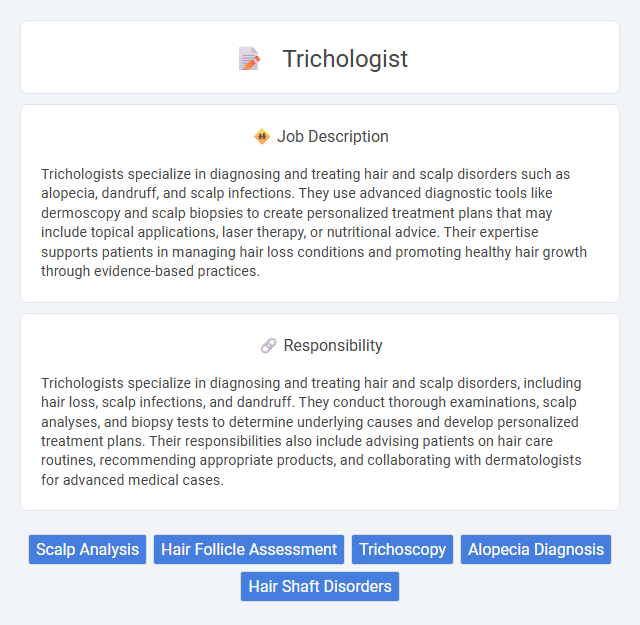
Trichologists specialize in diagnosing and treating hair and scalp disorders such as alopecia, dandruff, and scalp infections. They use advanced diagnostic tools like dermoscopy and scalp biopsies to create personalized treatment plans that may include topical applications, laser therapy, or nutritional advice. Their expertise supports patients in managing hair loss conditions and promoting healthy hair growth through evidence-based practices.
Individuals with a strong interest in scalp and hair health are likely to find a career as a trichologist suitable, especially if they are detail-oriented and enjoy diagnosing and treating hair and scalp conditions. Those who prefer hands-on work and have patience for long-term client care may also thrive in this profession. Conversely, people who are uncomfortable with close client interaction or lack an interest in medical and cosmetic scalp issues might find this job less appropriate for their skills and preferences.
Qualification
A Trichologist typically holds a certification or diploma in trichology, often obtained through specialized courses recognized by professional bodies such as the International Association of Trichologists. A strong foundation in biology, dermatology, or cosmetology is essential to understand scalp and hair disorders deeply. Clinical experience and continuous education on hair health and treatment innovations are critical qualifications for effective diagnosis and management in trichology.
Responsibility
Trichologists specialize in diagnosing and treating hair and scalp disorders, including hair loss, scalp infections, and dandruff. They conduct thorough examinations, scalp analyses, and biopsy tests to determine underlying causes and develop personalized treatment plans. Their responsibilities also include advising patients on hair care routines, recommending appropriate products, and collaborating with dermatologists for advanced medical cases.
Benefit
A trichologist likely offers significant benefits by diagnosing and treating hair and scalp disorders, which may improve overall hair health. Clients probably experience increased confidence and self-esteem as hair concerns are addressed effectively. The expertise of a trichologist might also help prevent further hair damage, leading to long-term scalp wellness.
Challenge
Trichologists likely encounter the challenge of diagnosing complex scalp and hair disorders that mimic other dermatological conditions. They might face difficulties in developing tailored treatment plans due to varying patient responses and the multifactorial nature of hair loss. Navigating these challenges probably requires continuous education and staying updated with the latest research in hair and scalp health.
Career Advancement
Trichologists specialize in diagnosing and treating scalp and hair disorders, offering career advancement opportunities through certifications such as the International Association of Trichologists (IAT) credentials. Progression in this field often includes roles like senior trichologist, clinic manager, or consultant for hair care brands and medical institutions. Continuous education in dermatology, hair biology, and advanced treatment techniques enhances expertise and career growth potential.
Key Terms
Scalp Analysis
Trichologists specialize in scalp analysis to diagnose hair and scalp disorders such as dandruff, psoriasis, and alopecia. Using high-resolution microscopes and digital imaging tools, they assess scalp health by examining hair density, follicle condition, and skin inflammation. Accurate scalp analysis enables personalized treatment plans, promoting hair growth and scalp rejuvenation.
Hair Follicle Assessment
Trichologists specialize in the comprehensive evaluation of hair and scalp health, with a key focus on hair follicle assessment to diagnose conditions such as alopecia, scalp infections, and folliculitis. Utilizing advanced diagnostic tools like dermoscopy and microscopic analysis, they examine follicle density, hair shaft strength, and scalp environment to develop personalized treatment plans. Their expertise guides the recommendation of medical treatments, topical solutions, or lifestyle changes aimed at stimulating healthy hair growth and preventing further follicular damage.
Trichoscopy
Trichologists specialize in diagnosing and treating hair and scalp disorders using advanced techniques such as trichoscopy, a non-invasive dermoscopic method that magnifies the scalp and hair follicles to detect conditions like alopecia, scalp psoriasis, and fungal infections. Mastery of trichoscopy allows trichologists to provide precise assessments by examining hair shaft abnormalities, follicular openings, and perifollicular pigmentation patterns. Expertise in digital trichoscopy imaging enhances diagnostic accuracy and treatment monitoring, improving patient outcomes in hair loss and scalp disease management.
Alopecia Diagnosis
Trichologists specialize in diagnosing alopecia by examining scalp health, hair follicle conditions, and patterns of hair loss using techniques such as dermoscopy and scalp biopsies. Accurate alopecia diagnosis involves identifying types like androgenetic alopecia, alopecia areata, or telogen effluvium to tailor effective treatment plans. Trichologists collaborate with dermatologists to ensure comprehensive care, incorporating nutritional advice, topical treatments, and laser therapy to manage hair loss effectively.
Hair Shaft Disorders
Trichologists specialize in diagnosing and treating hair shaft disorders such as monilethrix, pili torti, and trichorrhexis nodosa, which cause structural abnormalities leading to hair breakage and fragility. Their expertise involves detailed scalp analysis, microscopic hair examination, and the development of personalized treatment plans including topical therapies, nutritional guidance, and lifestyle adjustments. Advanced knowledge in hair biology and pathology enables trichologists to effectively manage these conditions, improving hair strength and overall scalp health.
 kuljobs.com
kuljobs.com